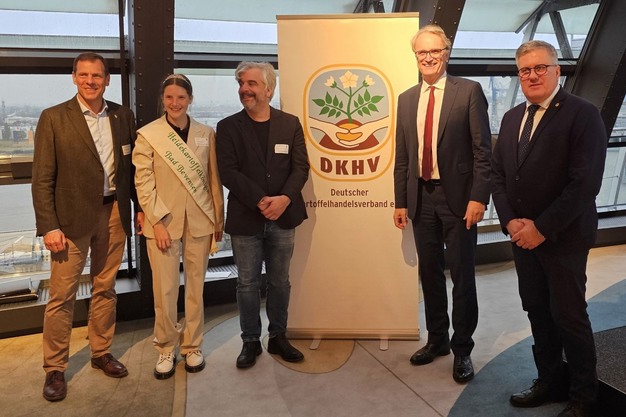The 71st International Potato Autumn Fair, organised by the German Potato Trade Association (DKHV), brought together representatives of the entire potato industry in Hamburg on 1 October. DKHV President Thomas Herkenrath warmly welcomed guests of honour, participants, the attending press and exhibitors. He thanked the 17 exhibiting companies for their great interest and commitment. Afterwards, Heidekartoffelkönigin Paula I and State Councillor Andreas Rieckhof from the Ministry of Economics and Innovation of the Free and Hanseatic City of Hamburg welcomed the 140 participants.
Dr Christoph Endres, computer scientist and AI researcher, gave a keynote speech titled "Protecting the digital harvest from pests: Cybersecurity in the potato trade" and highlighted the increasing importance of cybersecurity in the digitalised supply chain and trading process. He emphasised that the threat of cyberattacks is also increasing significantly in the agricultural and food industry. The presentation offered valuable insights into typical threat scenarios for the potato trade and practical tips for securing sensitive data and systems, which visibly captivated the audience. In particular, the new EU directive on ensuring a high level of network and information security (NIS-2), which obliges many companies to take preventive security measures from 18 October, stimulated intensive discussions. The topic not only characterised the subsequent Q&A session, but was also the subject of lively discussion throughout the rest of the evening.

From left to right: DKHV Managing Director Sebastean Schwarz, Heidekartoffelkönigin Paula I, State Councillor Andreas Rieckhof from the Ministry of Economics and Innovation of the Free and Hanseatic City of Hamburg and DKHV President Thomas Herkenrath.
Demanding framework
The Autumn Fair is regarded as a key mood barometer of the potato industry. The general mood was predominantly positive due to the forecast large harvest of 12.7 million tonnes of potatoes, but there are still many potatoes in the ground and uncertainties such as weather influences, disease pressure and quality issues could still reduce the marketable quantity. DKHV President Herkenrath thanked all members, whose commitment makes the active life of the association possible in the first place. He summarised: "The framework for potato cultivation this year was extremely challenging. There was already unusually high rainfall throughout Germany in the spring. In some places, the soil was so wet for so long that the last plantings could not be completed until mid-June."
Nevertheless, many tubers were successfully planted under optimal conditions. Herkenrath: "In some regions, areas were severely damaged by flooding and persistent rainfall. The wet weather in spring, which lasted well into May, led to increased pressure from diseases, particularly late blight, throughout the country. We are concerned about the ever more restrictive political regulations regarding plant protection, which are making it increasingly difficult to combat diseases and pests. For a long time, a potato harvest similar to last year's was expected, despite a 9 per cent increase in acreage."
Enormous yield differences between the growing regions
However, the yields determined from representatively selected sample areas for the BMEL's Special Harvest and Quality Assessment (BEE) assume a record potato harvest of 12.7 million tonnes with a calculated yield of around 44 tonnes per hectare. "The BMEL itself points out that this figure could still change. This is partly due to the fact that only 46% of the almost 700 sample areas have been analysed so far. As many more areas still need to be cleared in addition to these areas, it is still too early at this stage to make a final assessment of the overall situation in terms of harvest volume and available qualities. The regional differences between yields are also enormous. This gross value therefore says little about the actual harvest expectations for the individual utilisation directions. Ultimately, the quality and stability of our stocks are decisive for the quantities that will be available for marketing in the coming months," says Herkenrath.
The focus is now on the International Berlin Potato Evening on 4 February 2025 in Berlin, which is eagerly awaited.
For more information:
www.dkhv.org










